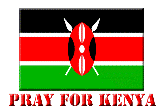Prof. Maicibi argues that, "When one has 'gotten' (reached) to the highest level one wished, one does not want to relinquish that prestige or status to anyone else. Therefore, one's behaviour is all directed towards maintaining or consolidating what is already one's."
He adds: "This is true of African leaders. Indeed, this is even the highest or strongest motivation need to the extent that it is capable of making the position occupants attempt possible elimination of potential contestants to such thrones."
In the context of the situation in Kenya, President Kibaki has struggled hard since Daniel Arap Moi dumped him as Vice-President and Minister of Finance following the equally farcical elections of September 1988. His fortunes changed in 2002 when, ironically, his alliance with Raila Odinga - under the post-Cold War international re-alignments that saw the West turn its back on African leaders like Moi - brought him back to the centre of Kenyan politics. Getting overwhelmingly elected as president was, indeed, Kibaki's self-actualisation.
He needs no job today. He is wealthy and at 76, his sun is about to set. Nevertheless, going by Prof. Maicibi's modified version of Maslow's theory, Kibaki still has an unsatisfied need: to consolidate all that he has struggled hard to attain.
This consolidation need, according to Prof. Maicibi, explains "the sit-tight" behaviour of most of our leaders. So maybe we should not view Kibaki as an evil man who has no shame even when his rush to be sworn in for a second term of office has led to such wanton destruction of life and property in Kenya and economic hardships in our own country. Perhaps we should try to see him as a man who aspires to attain the very highest of human needs.
Quotes from what drives Kibaki to cling to Power by Okadan Okwap.
My interpretation of Mwai Kibaki's behaviour to date, differs from that of the writer of the article. I have a positive view of human nature in general, and believe that in this situation Mwai Kibaki was doing the best that he could do. The best that he could do for himself.
Most of us know that his actions were not the best for Kenya. I struggle with the fact that if this is the best that he can do, I definitely do not want to be around when he is at his worst.
Somewhere on Maslow's hierarchy of needs, there is , a level for self esteem. This involves respecting others. This is where I feel that Mwai Kibaki has blanked out.
To get to a state of self actualisation, he would need an acceptance of facts, according to Maslow. It seems that Mwai Kibaki feels that he has been accepted, and gained recognition from a segment of the Kenyan population, so Kazi iendelee(the dreaded word).
I have a hunch that his rigging of the election, he adds to one of his greatest achievments. However,it is his understanding of morality that I have difficulty with.
The question is how much of his behaviour is conscious, and how does this affect his thinking at 76?
Did Gachagua change his mind because of this shocking poll?
-
Shocking results from a recent poll reveal what analysts have been
suspecting all the time. There is a very significant shift taking place in
Kenyan politi...
1 day ago




